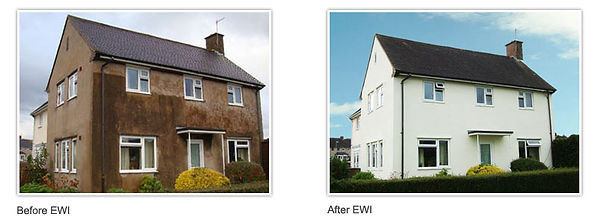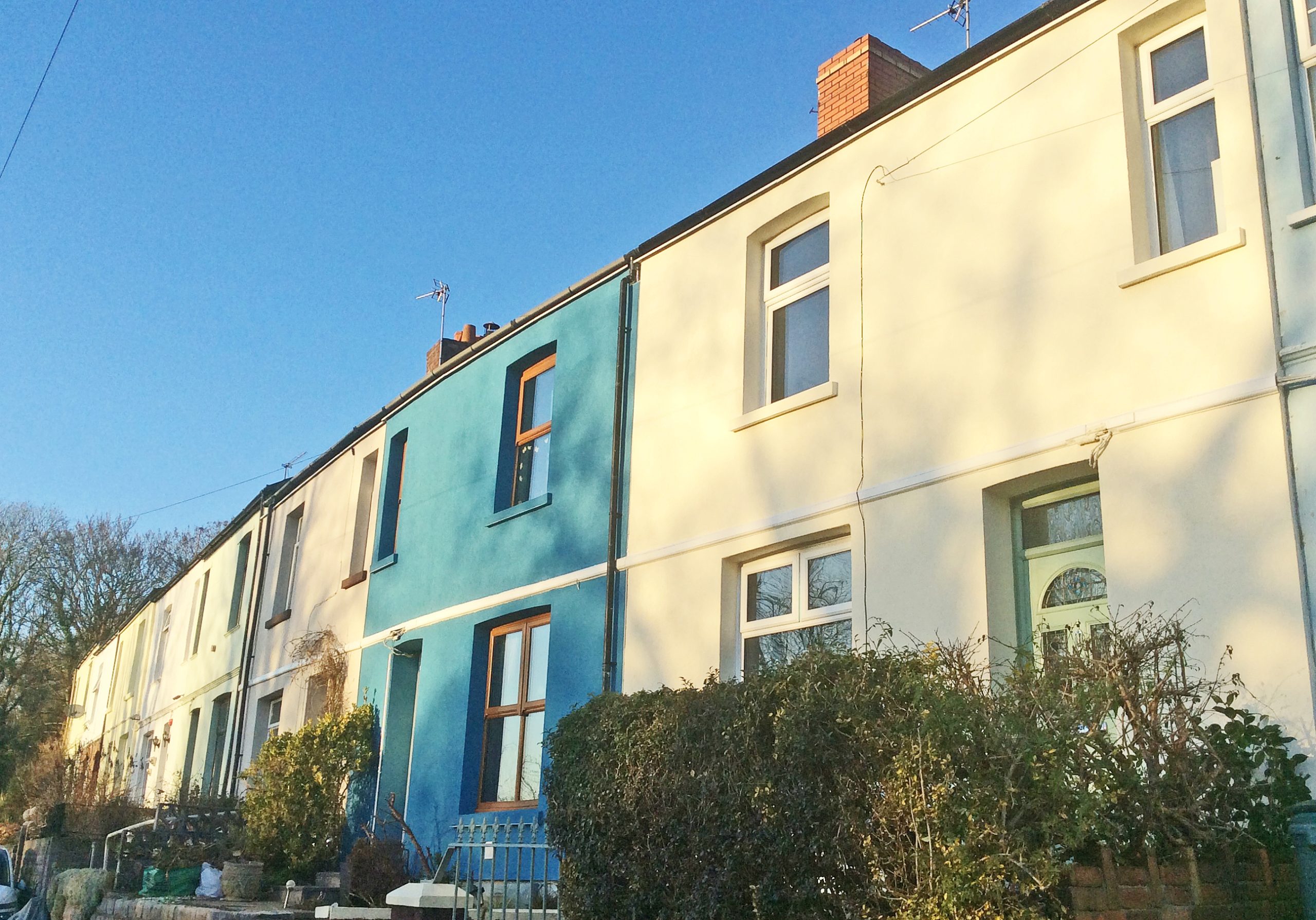External Wall Insulation (EWI)
External Wall Insulation can save up to 45% on your heating bills
External Wall Insulation Grants - All You Need to Know

Is your home cold and draughty? Are you worried about your next heating bill? External wall insulation (EWI) could make your home significantly more comfortable and energy efficient. Thanks to external wall insulation grants, you could receive funding of up to 100% if you meet the qualifying criteria.
Benefits of external wall insulation at a glance:
- Reduces energy costs
- Lowers carbon dioxide emissions
- Enhances indoor comfort
- Improves home aesthetics
- Can stop penetrating damp problems
- Protects against external noise
- Can help reduce issues related to condensation and mould
- Can increase the value of the property by raising the EPC rating of the home and also by the improving the properties ‘kerb appeal’
At Energy Saving Grants, we help homeowners throughout the UK to keep their homes warmer and reduce their energy bills, by taking advantage of external wall insulation grants. Government grants for external wall insulation like the ECO scheme and Great British Insulation Scheme (GBIS) are making this a reality for thousands of homeowners.
Our experts can tell you more about external insulation government grants and whether you qualify.
- Government grants of up to 100% are available for external wall insulation
- Quick decision and turnaround
- Trustmark approved installers
Why consider external wall insulation?
External Wall Insulation (EWI) is an effective method for enhancing the thermal efficiency of UK homes, particularly those with solid walls where cavity wall insulation isn’t an option.
Imagine wrapping your home in a thermal layer, cutting heating costs significantly and improving your property’s appearance. That’s the beauty of EWI and you could have this work carried out for FREE through the latest external cavity wall grants.
Let’s take a closer look at the benefits of EWI along with an overview of the EWI grants available.
Energy Efficiency and Cost Savings: EWI can lead to significant reductions in energy bills by improving your home’s thermal efficiency. Installing solid wall insulation can save homeowners between £180 to £860 every year on energy bills, depending on the property size and insulation type.
Reduced Carbon Footprint: In addition to financial savings, EWI can substantially reduce a home’s carbon emissions. Detached properties, for instance, could save up to 1,500 kilograms of CO2 emissions each year.
Enhanced Comfort and Soundproofing: By maintaining a more stable indoor temperature, EWI makes homes more comfortable throughout the year. It also improves sound insulation, helping to keep out external noise.
Improved Aesthetics and Property Value: EWI offers the opportunity to refresh the external look of a home, potentially increasing its market value and ‘kerb appeal’.
Moisture Management: External Wall Insulation can help manage moisture movement and ventilation, preventing condensation and penetrating damp problems that can affect older buildings.
How does external wall insulation work?
External Wall Insulation (EWI) enhances a building’s warmth and energy efficiency by adding a thermal insulation layer to its exterior. This method is particularly effective for buildings with solid stone or brick walls, which lack natural insulation properties.
External Wall Insulation For Stone Walls
For stone walls, typical of older buildings, EWI provides a solution to improve insulation without altering the building’s interior. It helps retain heat, reduces energy consumption, and protects the stone from weather effects.
External Wall Insulation For Brick Walls
Brick walls benefit similarly from EWI. It prevents heat loss, updating the building’s exterior look while also offering soundproofing benefits. EWI is a strategic upgrade for energy conservation, making it a valuable choice for homeowners with solid wall properties.
Is my home suitable for external wall insulation?
Before applying for an external insulation grant, it’s important to understand what properties are suitable for external wall insulation.
Solid Wall Properties: Homes built before the 1920s are likely to have solid walls without a cavity, making them ideal candidates for EWI.
Homes Requiring External Refurbishment: If your home’s exterior needs repairs or updating, combining these works with EWI can be cost-effective and enhance thermal performance.
Do I qualify for an external wall insulation grant?
If you are a homeowner or tenant and you receive a qualifying benefit, you could be eligible for an external wall insulation grant. Unfortunately, we are unable to help people in social housing, so please speak to your housing provider in this instance.
Our energy grants specialists are waiting to help you…
Energy Saving Grants offers free no-obligation advice on the Government’s Energy Company Obligation (ECO) Scheme and other UK external wall insulation grant schemes. We can also assist with loft insulation and internal wall insulation. Apply now using our online form and an energy saving specialist will contact you to discuss your eligibility.
- Free expert advice and application assistance
- OFGEM backed energy saving grants schemes
- Quick and simple application
Applying for external wall insulation grants is as easy as
- Eligibility Check: Use our form to see if you qualify for ECO4 or other external wall insulation grants.
- Free Survey: Get a no-cost assessment from a qualified energy assessor for tailored energy-saving suggestions.
- Installation: Have our Trustmark installers upgrade your home efficiently, backed by grant support.
Maximise Your Home’s Warmth with Government Grants for External Wall Insulation
Discover how you can save on heating bills and make your home more comfortable with government grants for insulation. Energy Saving Grants is here to help homeowners like you navigate the funding options available. Let us guide you through the process, from uncovering which grants you can apply for to getting the support you need to upgrade your home. Contact our team today or get started by filling in our simple form below.
FAQ for External Wall Insulation Grants
A: There are various Government energy saving grant initiatives to help towards the cost of having EWI professionally installed, to the outside of your home, to reduce heat loss from the property and help lower energy bills.
A: Homeowners and private tenants can apply. The amount of funding will vary, depending on the specific criteria set by the grant scheme, such as property type, type of heating in the property etc.
A: Savings vary, but External wall insulation can significantly reduce heat loss, lowering heating bills by hundreds of pounds every year.
A: Planning Permission is not normally required for External Wall Insulation. However, if you live in a Conservation Area, a National Park, an Area of Outstanding Natural Beauty, or in a listed building, then Planning consent will usually be required.
A: Unfortunately you cannot apply retrospectively for any work that has already been installed. It is a requirement to apply for a grant before starting any work.
A: The timeline can vary, typically ranging from two to four weeks, depending on the size of your home, the complexity of the job and the weather conditions.
A: Yes, it will, but there are many finish options available to ensure your home looks great, including coloured render, pebbledash, brick slips, cladding and timber effect finishes.
A: It’s ideal for homes with solid walls, properties that are system built (eg BISF and Woolaway construction); and can also be installed on properties of cavity construction. However, not all properties may be suitable and a professional assessment will be required to determine this.
A: Building Regulations (Part L1B) sets energy efficiency requirements where more than 50% of an external wall (or more than 25% of the overall building envelope is being renovated).
This means that whatever renovation you are undertaking to your wall, if it affects more than half the wall (or more than a quarter of the overall building envelope) you will need to add insulation to improve the thermal performance of the whole of that individual thermal element.
A: External wall insulation is generally maintenance free. The exterior finishes are designed so they do not allow the growth of mould. Maintenance should be limited to the need to wash down occasionally to maintain an “as-new” appearance
A: A U-value is a measure of how much heat is transferred through a given material; the lower the U-value, the better the insulator it is. Installing 90mm of external wall insulation onto a typical 225mm thick solid brick wall can reduce the U-value from around 2.70 W/m2K to around 0.29 W/m2K – which is better than most new-build properties!
Check Your Eligibility Using Our Grant Checker
Please ensure that all information provided below is 100% accurate. Any errors in your personal information could delay or prevent you qualifying for a government funded grant
Please note that you do not necessarily need to be in receipt of tax credits or benefits as we still may be able to obtain funding for you via your Council or through other funding schemes.
